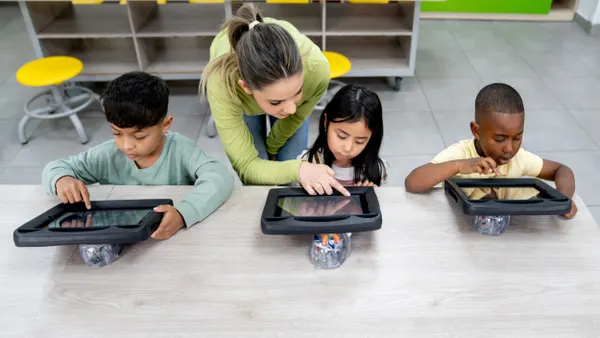Dive Brief:
- Putting one educator in charge of a large initiative — such as personalized learning — can send the message that no one else is responsible for making sure practices change to meet the school’s or district’s goals, Blair Mishleau, the director of personalized learning for the Western School of Science and Technology in Phoenix, AZ, writes for EdSurge.
- When Mishleau was recruited out of his technology teaching position to lead personalized learning efforts at the charter school, he realized how isolated his position was and how little impact he had on what was happening in the classroom. “I realized that I had become the ‘personalized learning guy,’” he writes. “As a result, perhaps unintentionally, other staff members felt limited accountability for making learning personal at our school.”
- He began to meet individually with teachers who were interested in shifting to a more personalized approach, created a system for teachers to earn microcredentials as they learned about personalized learning, and is now focusing on helping school leaders make “informed choices” about practices that support the model. He’s also transitioning to a part-time role and writes that he’s “hopeful that once the initiative isn’t in the hands of a single person, the school will thrive.”
Dive Insight:
With all of the responsibilities that teachers already have, it can be easy for them to ignore new initiatives if school leaders haven’t clearly communicated the purpose of the effort and their role in it. That’s why Mishleau's focus on early adopters — those educators who are already eager to change their practices — was more effective. Teachers are often more likely to take interest in what their peers are doing rather than showing immediate enthusiasm for an effort that seems top-down.
In an earlier EdSurge piece, Kevin Cuppett, the executive director of Curriculum, Instruction and Innovation for Frederick County (MD) Public Schools, writes that when implementing a blended and personalized learning program, he looked to the work of sociologist Everett Rogers, which focuses on “consumers” who adopt innovation.
“Our initiative, to date, only targets our innovators and early adopters, and is based on identifying these innovation leaders by having them opt in,” Cuppett writes. “We suggest you start here as well, even if your district has the funds to work with more teachers. Your return on investment will be better, you’ll create successful use cases, and these teachers will be instrumental in diffusing the innovation throughout the district.”













